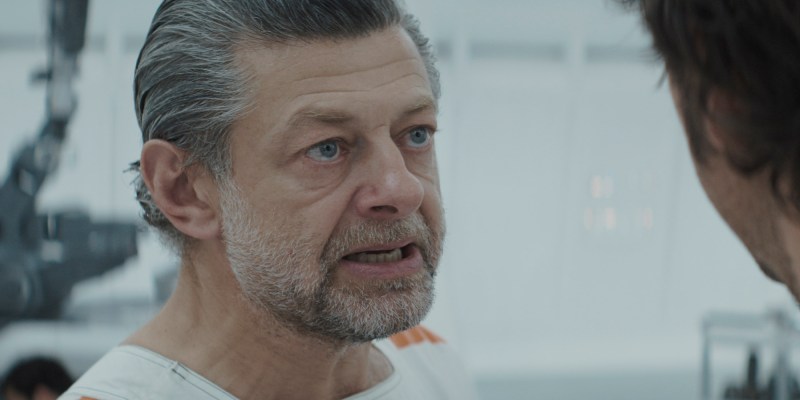This discussion and review contains spoilers for Andor episode 8, “Narkina 5.”
In the end, Andor understands that the Empire is built on money as much as ideology.
To be fair, Star Wars has always understood that capitalism is a driving political force. After all, The Phantom Menace was famously a movie that opened with a blockade tied to the taxation of trade routes. However, Andor has made a point to weave capitalism into its understanding of the systems of oppression and revolution. While Andor understands what exactly it is that makes the First Galactic Empire an imperial power, it also understands that it is tied to money and enrichment.
This was obvious from the outset. The inciting incident in “Kassa” was an example of overreach by the “corporate tactical forces” employed by Preox-Morlana. Mon Mothma (Genevieve O’Reilly) is laundering money for the nascent rebellion. The high-profile “announcement” of the rebellion in “The Eye” was the theft of the payroll for an entire Imperial sector. Revolutionary Karis Nemik (Alex Lawther) was literally crushed under the weight of capital.
In Rogue One, Jyn Erso (Felicity Jones) argued that “rebellions are built on hope.” It is a nice idea, but Andor understands that there are more grounded logistical issues to address. In “Narkina 5,” Luthen Rael (Stellan Skarsgård) meets with Saw Gerrera (Forest Whitaker) to trade technology. Rael has to deny his involvement in the payroll raid, but Gerrara is openly jealous of the funds that such a robbery would provide. “Somebody’s sitting on some dosh,” Gerrera muses.
This is the reality of the universe in which the characters find themselves. The Empire is obviously an imperialist and fascist organization, but Andor suggests that its means of oppression are inexorably tied to capitalism. In “Announcement,” Colonel Yularen (Malcolm Sinclair) stressed that the Empire’s response to the Aldhani raid would include financial measures, such as “a tribute tax equal to five times the amount stolen from Aldhani” to be levied against any sympathetic sectors.
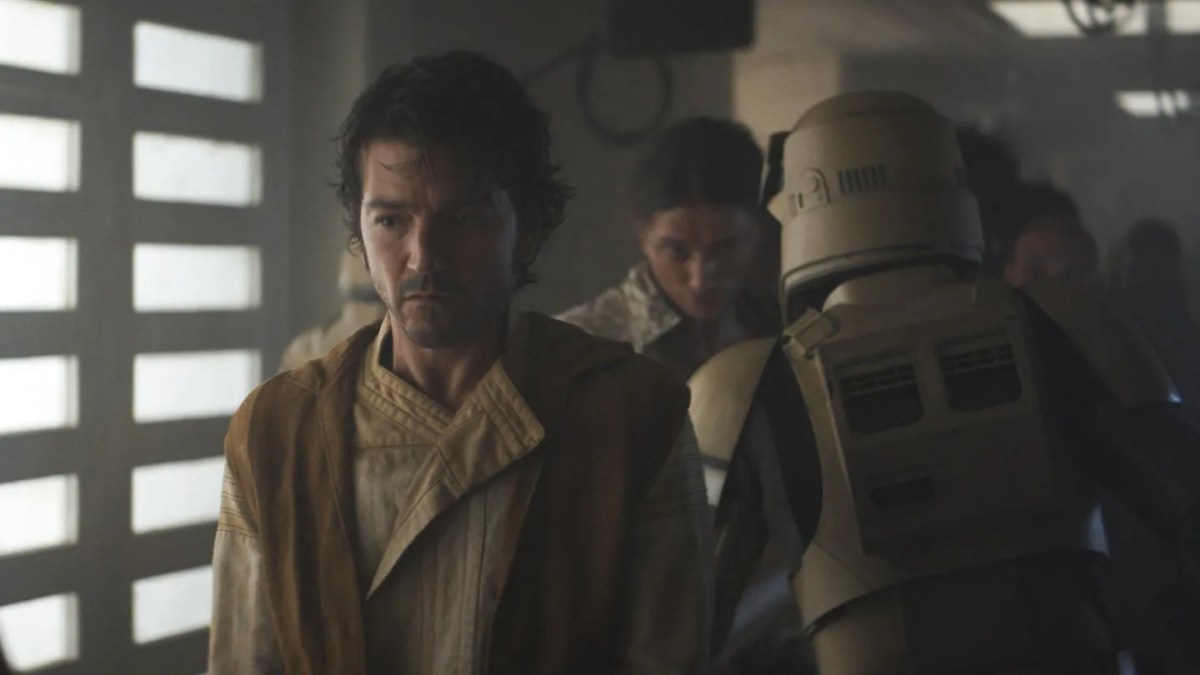
In meetings at the Imperial Security Bureau, the Empire’s objectives are measured in terms of resources as frequently as in reference to ideology. Early in “Narkina 5,” Supervisor Dedra Meero (Denise Gough) has to justify the “wishlist” she has placed before Yularen. “It’s a large investment,” he complains. Meero doesn’t justify her request by contending that it might save lives, but instead makes a financial argument. “It’s a fraction of the price of lost technology,” she counters.
That appears to be enough to convince Yularen to sign off on the request to deploy these resources to Ferrix. The consequences of this decision are also measured in financial terms. Salman Paak (Abhin Galeya) complains that his business is struggling to stay afloat following the Imperial occupation of the planet. Back on Coruscant, Tay Kolma (Ben Miles) complains that “banking regulations” have made it harder to move funds under the watchful eyes of the authorities.
Even the Empire’s militantism all ties back to that underlying question of resources and capital. When Cassian Andor (Diego Luna) finds himself sent to the penal colony on Narkina 5, he discovers that it is “an Imperial factory facility,” where all the inmates have been deemed “labor-worthy.” Those arrested as part of the sweeping expansion of the Empire’s powers in the wake of the raid on Aldhani are reduced to exploitable resources, unpaid manual labor working off their “tab.”
Indeed, “Narkina 5” seems to suggest that any punitive or rehabilitative function of the eponymous facility is just a façade. “Announcement” ended by cutting between Cassian Andor being sentenced and Syril Karn (Kyle Soller) becoming a “lifetime employee” of the Bureau of Standards, suggesting Karn was serving his own prison sentence. “Narkina 5” uses similar cuts between the two to reinforce the opposite idea, that Andor is now a “lifetime employee” of the Imperial war machine.
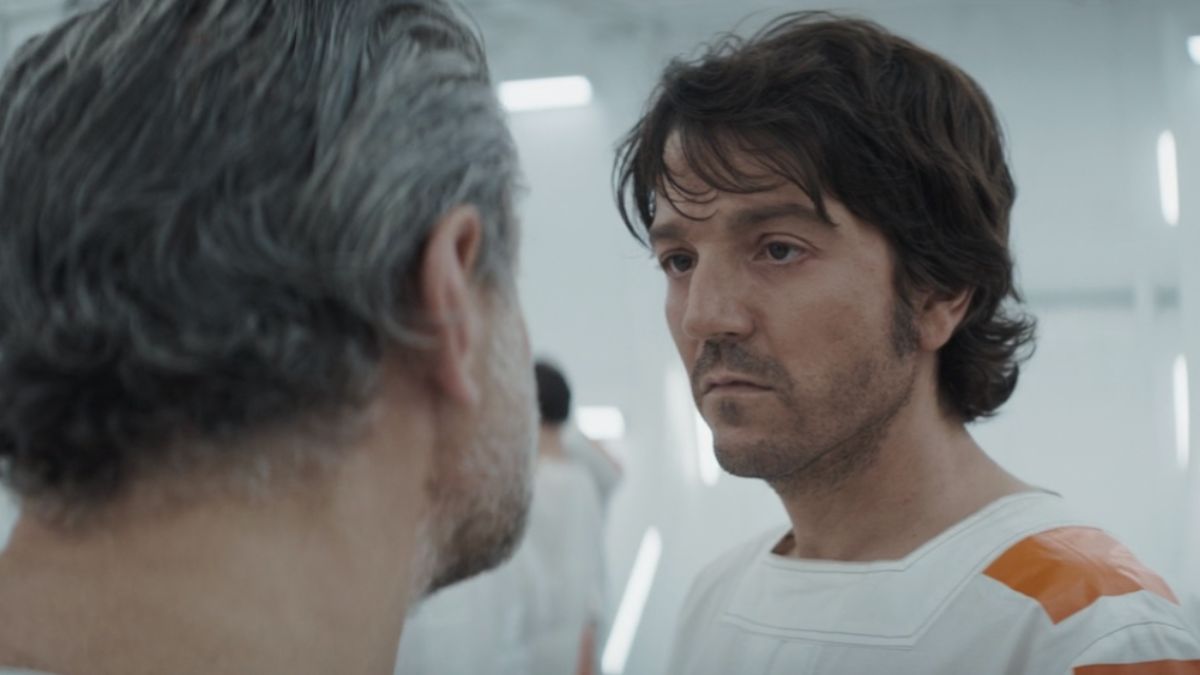
On Narkina 5, everything bends to productivity. The functioning of the facility’s infrastructure is secondary to meeting targets, and “delivery takes priority over tech.” The intake warden (Paul McEwan) warns about the prison’s “schedule and expectations.” Kino Loy (Andy Serkis) advises, “Productivity is encouraged. Evaluation is constant.” The bodiless announcer credited as “the Voice of God” (Martin Ware) assures that “the least productive (inmates) will be disciplined.”
The penal facility on Narkina 5 is an even more nightmarish version of the factory floor that Charlie Chaplin imagined in Modern Times, where there are groups of inmates working around groups of tables in clusters of rooms across multiple levels, building machinery for the Empire. There is something grim about the idea of these characters effectively constructing the tools that will be used to further oppress them and people like them. The system self-perpetuates.
It’s an unsubtle piece of social commentary, tying to the reality of what has been described as “the prison-industrial complex” within the United States, where prison inmates are reduced to an exploitable source of cheap labor for mass production. It is a process that has been consciously and consistently likened to the institution of slavery. Just like in “Narkina 5,” many of these prison laborers produce equipment for law enforcement. It is dystopian.
Andor understands the appeal of capitalism as an ideology for the Empire. After all, capitalism is a system built around rugged individualism and self-advancement. It is built on the assumption of competition, that there are winners and losers, and that others must fail for an individual to advance. Andor consistently argues that the Empire thrives by forcing both its subjects and its opponents into a struggle against one another, rather than in opposition to it.
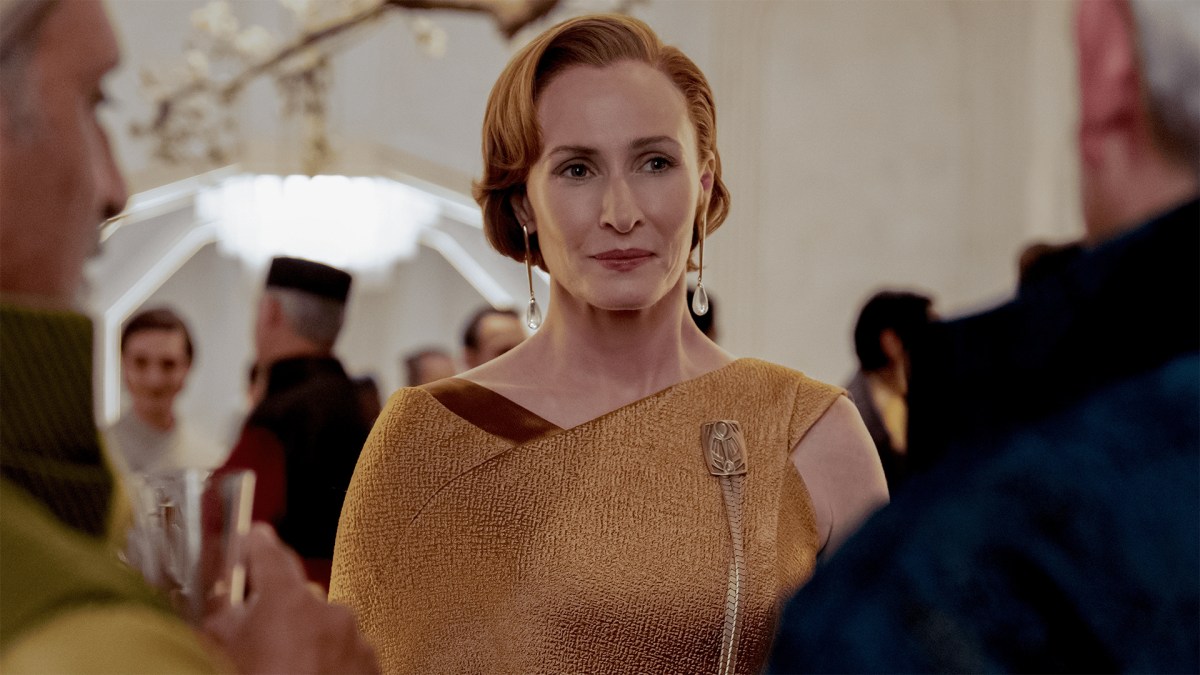
This is obvious even within the prison factory floor in Narkina 5. On arrival, Andor discovers that some of the prisoners have bought into the system of oppression as a means of self-advancement. Loy is a prisoner, but he is able to assert his dominance over other prisoners by furthering the means of production. He enjoys something that passes for status and privilege by perpetuating the systems of abuse and violence that the Empire has inflicted upon him. He competes.
“I have 249 days left of my sentence,” Loy explains. “I have a free hand in how I run this room. I’m used to seeing my room in the top three rooms of this level.” The assumption is that Andor will buy into this competition. “You play against all the other tables in this room,” Loy contends. “I play against all the other rooms.” It is winners and losers, within this oppressive framework. Andor draws attention to Loy’s use of the word “play,” but Loy is dismissive. “Call it what you will.”
“Narkina 5” is written by Beau Willimon, but it fits with showrunner Tony Gilroy’s worldview. As in the Bourne movies and in Michael Clayton, these monstrous systems are maintained by the petty bureaucrats jockeying for position within them, treating their own progression as a zero-sum game. Notably, both Meero and Karn are pursuing Andor not out of any ideological belief, but seeing it as a means to personal advancement within the Empire.
Karn fixates on Andor as a source of professional pride. “I was a good deputy inspector,” he boasts. “I was very good. I solved a double-murder and found the killer in two days.” He talks about “service to the Empire” and how Andor is “a threat to the Empire,” but it is clear he is nursing his own wounded ego. Meero clearly understands this, sarcastically challenging him, “So this is about public safety?” Of course, Meero is also pursuing her own advancement.
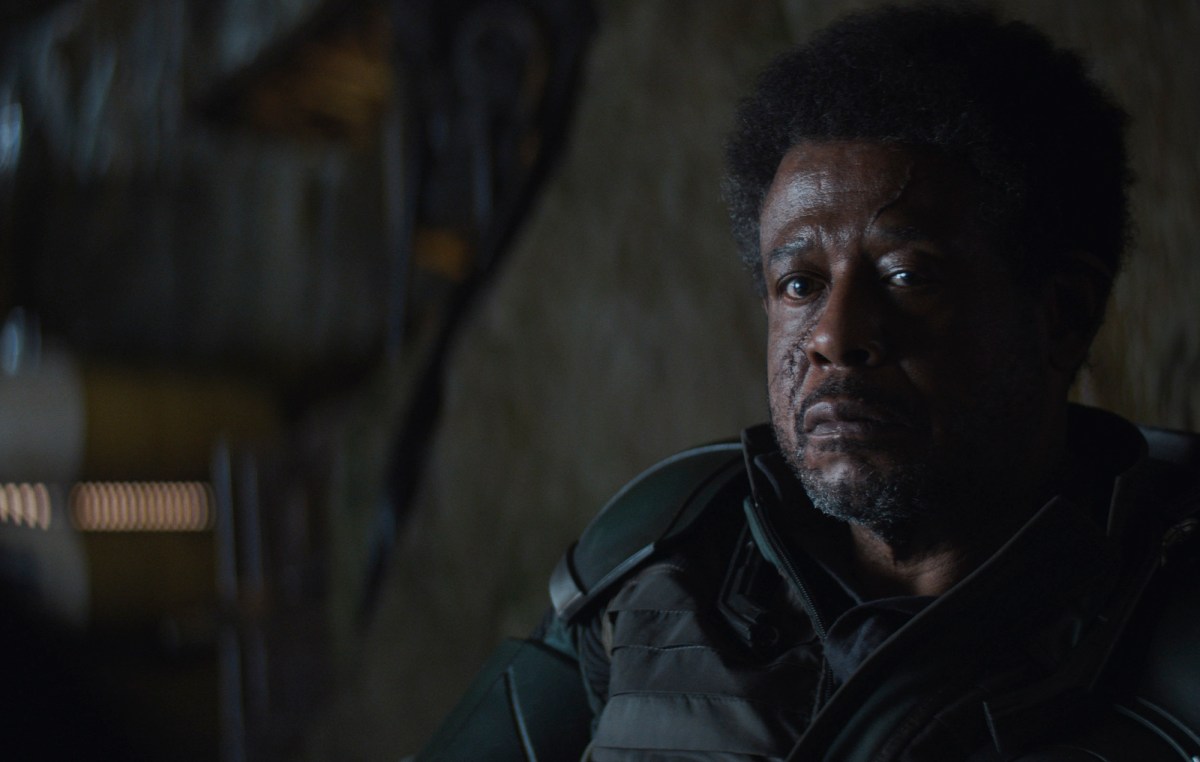
Andor is not subtle in drawing parallels to the War on Terror, which makes sense given that George Lucas framed the prequels in a similar light. Meero even gives the as-yet-unidentified Rael the codename “Axis,” to reinforce the connection. The Empire’s overreach and embrace of “surveillance and prosecution without limit” recalls the excesses of things like the Patriot Act. However, while it is easy to understand the War on Terror as an ideological conflict, Andor suggests an unsettling truth.
After all, the War on Terror made a lot of money for a lot of the people who advanced it. Halliburton, the private oil company formerly run by Vice President Dick Cheney, saw its profits soar after the invasion of Iraq. Cheney was still being paid by Halliburton during the American occupation. Even Republicans like Rand Paul have pointed out the profit motive for such interventionism. The $5 trillion invested in the conflicts in Iraq and Afghanistan largely filtered through to contractors.
Andor consistently argues that the Empire is designed to fragment potential opposition, to keep those within its control and under its thumb at odds with each other rather than aligned against it. Indeed, “Narkina 5” underscores the challenge facing any attempt to organize against the Empire, because it means forsaking personal interest for a shared collective purpose. It means sacrifice and compromise, which doesn’t come easy in a system that prioritizes competition.
Vel Sartha (Faye Marsay) and Cinta Katz (Varada Sethu) have to forsake their love of one another for the cause. “I told you up front,” Katz warns Sartha. “Struggle will always come first. We take what’s left.” Similarly, Rael struggles to convince Gerrara to dilute his “clarity of purpose” and align with other factions within the rebellion. “We need to pull together, Saw,” Rael argues. “Whatever our final version of success looks like, there’s no chance any of us can make it real on our own.”
In some ways, Gerrara is just as much a prisoner as Loy or Karn, even as he evades the Empire. He runs through the reasons why he can’t work with other revolutionaries. “Kreegyr is a separatist. Maya Pei’s a neo-Republican. The Gorman Front. The Partisan Alliance? Sectorists. Human cultists. Galactic partitionists. They’re lost. All of them, lost! Lost!” Ironically, this means Gerrara is just as lost himself. Despite his fixation on ideological purity, there’s “not much of (him) left” by Rogue One.
This sense of individualism is the real prison that the Empire builds. If the characters are to escape it, they need to act collectively.
